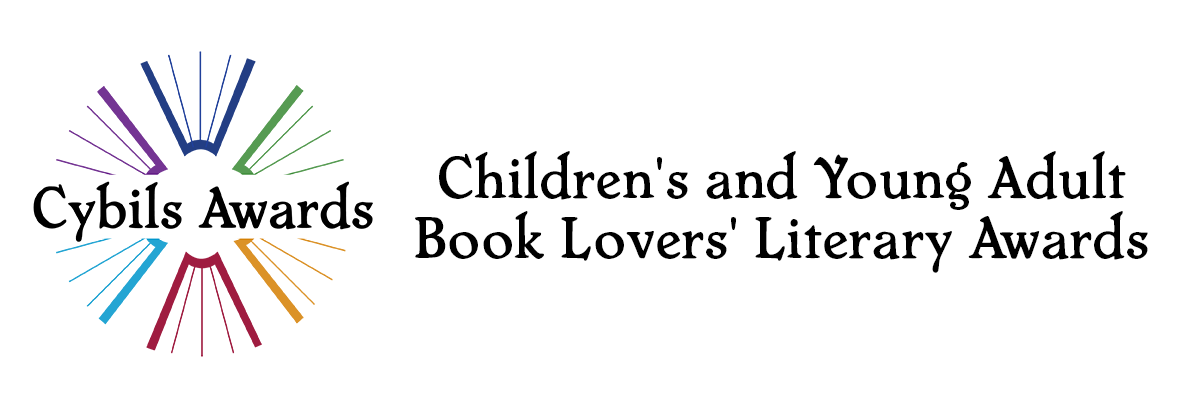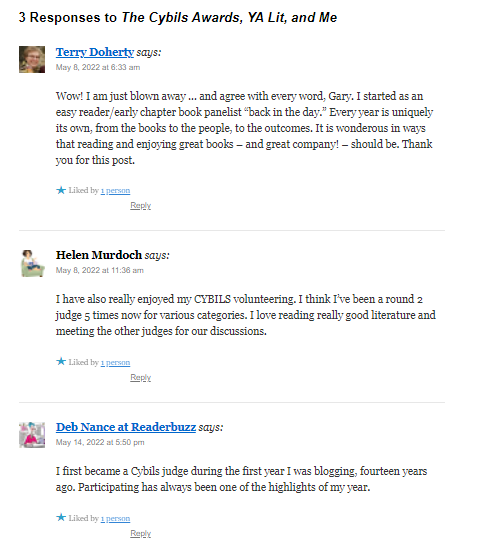This post, written by Young Adult Fiction Chair, Gary Anderson, was first seen on What’s Not Wrong? Gary’s blog. We are reprinting with permission.
Want to share why you love the Cybils Awards? Leave a comment on Gary’s post, here.
The Cybils Awards, YA Lit, and Me
by Gary Anderson
If you pay attention to the world of literature for young people, you have probably heard of the Cybils Awards and may have wondered what they are all about. From my vantage point as Young Adult Fiction Chair for the Cybils Awards, I can offer some perspectives and maybe even entice you to apply to become a judge.
The Cybils Awards name is (almost) an acronym for Children’s and Young Adult Bloggers’ Literary Awards. The Cybils Awards are judged by regular people from outside the publishing industry who read and write about literature for young people. The “Blogger” part of the name now embraces any online review platform. In addition to judges who post reviews on their personal blogs, we also have judges whose primary outlets include Instagram, TikTok, YouTube, Goodreads, and probably some other places.
This year, Cybils Awards were given in fifteen categories: Board Books, Fiction Picture Books, Easy Reader, Early Chapter Books, Elementary Nonfiction, Middle-Grade Nonfiction, Elementary Speculative Fiction, Middle-Grade Speculative Fiction, Middle-Grade Fiction, Poetry, Elementary/Middle-Grade Graphic Novels, Young Adult Graphic Novels, High School Nonfiction, Young Adult Fiction, and Young Adult Speculative Fiction. Sometimes there are more categories, sometimes fewer as the Cybils Board of Directors seeks to align categories with current trends in publishing that sometimes affect the contours of a given category.
Anyone can nominate one book in each category. After the public nomination phase ends, publishers and authors can nominate their own books that have not yet been nominated. Then the first-round panel of judges reads those books and selects between five and seven finalists. A separate second-round panel of judges reads the finalists and chooses the winner.
How did I become involved with this organization that has come to mean so much to me and drives a large percentage of my yearly reading? In 2015, after noting with curiosity some social media posts about the Cybils Awards, I saw a call for judge applicants and said what the heck. I applied and was selected to be a first-round judge in the graphic novels category. That was a lot of fun, and I learned an enormous amount about the breadth of graphic novels. (At that time, the graphic novels category was not separated into age groups.)
In 2016, I was selected to be a first-round judge for another category that fit my interests: Elementary/Juvenile Nonfiction. (The title of this category has now been changed.) In 2017, I was fortunate to be selected again for this category. I learned even more from this assignment, not just about the publishing trends of the category but from the wide variety of subjects covered in the books! This category also led me to assemble a remarkable National Council of Teachers of English panel featuring several authors whose work I grew to admire, and we presented “Building Persistence with Picture Book Biographies” at the annual NCTE convention in Houston in 2018. Thank you, Heather Lang, Chris Barton, Duncan Tonatiuh, Andrea J. Loney, and Nancy Churnin (pictured below)!

In 2018, I switched over to Young Adult Fiction and served there for two years before the Board asked me to become chair of that category, a position I immediately and gratefully accepted.
When the pandemic struck, it was understandably difficult to find enough judges. The Board decided that the same judges would handle both Young Adult Fiction and Young Adult Speculative Fiction for one year. That year I was co-chair with the venerable Pam Margolis, a Cybils Board member and chair of Young Adult Speculative Fiction. The judges read over a hundred books, but we brought it all in for a smooth landing.
This year the Young Adult Fiction category had 82 nominations. Narrowing down the finalists was a challenge, but we chose seven incredible and diverse books. The second-round judge panel, which does not include me, selected Tess Sharpe’s The Girls I’ve Been as the winner.
So, why do we do this? Speaking for myself, I wouldn’t stick around if I wasn’t having fun. And it is fun. A lot of fun. The camaraderie among the judges is exactly the kind of collaborative collegiality that I enjoy and value. Every judge is a volunteer who is passionate about books for young readers, and they are such a nice group of people. Each chair I’ve worked with has been respectful of the volunteers’ time, and I do my best to uphold that. Although every chair handles communication and meetings a little differently, I do it mostly through email, Google Groups threads, and a Zoom meeting at the end. It’s strange to consider, but I’ve never met another Cybils judge in person except for the one who happens to be a favorite neighbor.
In addition to enjoying my Cybils Awards work, I’m also proud of what we do. The Cybils Awards is committed to inclusivity and diversity. Part of my job as a category chair is eliminating from consideration books that perpetuate stereotypes through language, portrayals, or attitudes. Everyone in the Cybils organization is sensitive to and united in this effort. In one case, I called out an author who gratuitously used insensitive language in a passage in her book. The author contacted me to apologize, thanked me for the eye-opener, and assured me that the wording would be changed in subsequent editions. Can we agree that the Cybils Awards made a concrete difference in that specific instance?
I’m also proud to support the young-adult publishing industry and its authors. We’re in a strange period right now, and I’m glad to be in a position to help keep the spotlight on outstanding books that a loud but relatively small group of low-grade zealots would like to snuff out.
Another advantage of being involved with the Cybils Awards is learning more about publishing for young readers. It’s a fascinating area, and I’ve gained insights into imprints, independent publishers, trends, editing and revision practices, and author-publisher relations. I hope all of this makes me a more astute reviewer and consumer.
There are two other perks of involvement with the Cybils Awards that might seem a little self-serving. One of them is receiving free books. It varies by year, but I always end up with a dozen or two free books specifically for Cybils judging that are provided by generous publishers. This apparently puts me on various mailing lists because I also receive book mail from publishers throughout the year that has no direct connection to the Cybils. Cybils judges are prohibited from selling these books, so I appreciate the opportunity to donate them to various classroom libraries and Little Free Libraries.
The other perk is that Cybils actively promotes judges’ reviews throughout the year on its web site and social media outreach. In other words, judges can easily upload links to their reviews, and they will eventually appear on Cybils.com and Twitter with synced links to wherever they were originally posted. I don’t know about you, but when I write a review, I like it when my thoughts are read, and the Cybils organization definitely makes that happen.
Now that I’ve written this, I’m kind of amazed at how much I have to say. Before putting this all down in writing, I knew how much I value the Cybils Awards, but I never really thought about all of the good stuff together at the same time. Wow. It’s a lot.
I hope you will follow the Cybils Awards on social media (Instagram, Twitter, and Facebook), and check in on the Cybils web site. The call for judges rolls out [circa] August 18, 2022, so please mark your calendar if you would like to join in, and of course, if you have questions, please let me know. Until then, happy reading!
Check out the comments on Gary’s post, then head over to What’s Not Wrong? and add yours!


